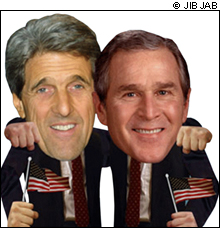 OPG v. Diebold
(2004)
OPG v. Diebold
(2004)
When two Swarthmore students published information about major security flaws in Diebold e-voting machines, the corporation rattled its swords, claiming copyright infringement. The EFF called Diebold’s bluff, striking a blow against abusive copyright claims under the Digital Millennium Copyright Act.
Doe v. Ashcroft
(2004)
The EFF filed an amicus brief to help the ACLU and an unnamed Internet-service provider challenge the constitutionality of secret subpoenas, a powerful prong of the USA PATRIOT Act. The court ruled that the subpoenas, and gag orders that prohibit recipients from revealing their existence, violate the First Amendment and Fourth Amendment rights of ISPs, and the First Amendment rights of the people who use them.
MGM v. Grokster
(2004)
The EFF went before the Ninth Circuit Court of Appeals to prove that the makers of P2P software weren’t liable for copyright infringement by their users. Upholding the “Betamax doctrine,” the 1984 Supreme Court decision that manufacturers can’t be responsible for users’ copyright violations if the technology (e.g., the Sony Betamax VCR) has substantial legal uses, the Ninth ruled in P2P’s favor — an important protection for technological innovation. (On appeal, the Supreme Court did rule against Grokster itself, but didn’t overturn the Betamax decision.)
JibJab Media v. Ludlow Music
(2004)
In defending the makers of the widely circulated “This Land is Your Land” animated clip — in which George W. Bush and John Kerry trade verses of Woody Guthrie’s classic — from a litigious publishing-copyright holder, EFF uncovered evidence that the song is actually in the public domain.
ADVERTISEMENT
 |